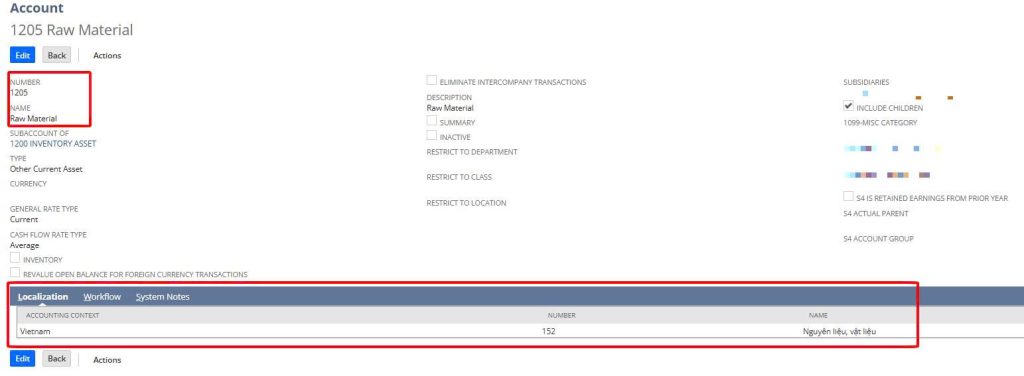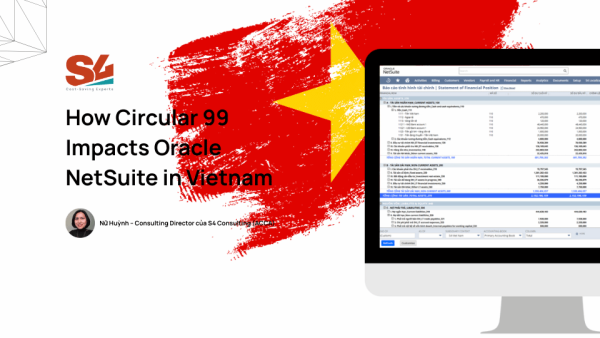
How NetSuite Localization for Vietnam Works: COA Mapping & Multibook Accounting
NetSuite Localization for Vietnam: How to Stay VAS-Compliant While Using Your Parent COA
Global enterprises expanding into Vietnam face one recurring challenge: How can they comply with Vietnamese Accounting Standards (VAS) while still maintaining the same Chart of Accounts (COA) used by their parent company – typically under US GAAP, IFRS, or SFRS?
1. Vietnam’s Accounting Rules: Circular 200 and 133
In Vietnam, companies cannot freely design their own Chart of Accounts (COA).
The Ministry of Finance defines the COA structure through two main regulations:
| Circular | Applies to | Purpose |
|---|---|---|
| Circular 200 | Medium and large enterprises | Comprehensive accounting and reporting framework |
| Circular 133 | Small and medium enterprises | Simplified version of VAS |
All companies operating in Vietnam must:
- Use the account numbers and structure defined in these circulars.
- Prepare financial statements following the official VAS formats (Balance Sheet, Income Statement, etc.).
Therefore, multinational groups need a system that allows:
- Full compliance with Circular 200 or 133, and
- Consistent reporting with the parent company’s COA.
NetSuite’s Localization for Vietnam provides this flexibility through two main mechanisms:
(1) Multibook Accounting, and (2) Account Mapping (COA Translation).
2. Overview of the Two Mechanisms
| Approach | How It Works | Best For | Example |
|---|---|---|---|
| Multibook Accounting | Records each transaction in multiple general ledgers (books) simultaneously. | Large enterprises requiring strict audit and compliance. | One purchase recorded under both US GAAP and VAS. |
| Account Mapping | Records once under the parent COA, then automatically “translates” it into VAS format for reporting. | Companies seeking faster setup and lower cost. | “Raw Material” (parent COA) maps to “152 – Nguyên liệu, vật liệu” (VAS COA). |

3. Multibook Accounting – Parallel Ledgers
Concept
Multibook Accounting in NetSuite allows a single financial transaction to be automatically recorded in multiple general ledgers (“books”), each using its own accounting standard — such as VAS, IFRS, US GAAP, or Tax.
| Example Transaction | Book | Accounting Rule Applied |
|---|---|---|
| Purchase of office furniture | Primary Book: VAS | Recorded under “211 – Tangible Fixed Assets” per Circular 200 |
| Secondary Book 1: IFRS | Recorded as “Property, Plant & Equipment” under IFRS | |
| Secondary Book 2: Tax Book | Recorded according to Vietnamese tax depreciation rules |
Availability and Licensing
- Multibook Accounting is available only in the NetSuite OneWorld module.
It is not included by default. To use this feature, the customer or partner must raise a support ticket with Oracle NetSuite to enable Multibook functionality. - Customers using the NetSuite SuiteSuccess edition will not have Multibook Accounting included.
To activate it, an upgrade to OneWorld is required.
Once enabled, Multibook allows configuration of separate books for:
- VAS (Vietnam Local GAAP)
- IFRS
- Tax Reporting
- Parent GAAP (e.g., US GAAP or SFRS)
Example in Action
A manufacturing company records a purchase of a new production machine.
NetSuite automatically generates three sets of journal entries:
| Book | Account | Description |
|---|---|---|
| VAS Book | 211 – Tangible Fixed Assets | Recorded according to Circular 200 |
| IFRS Book | Property, Plant & Equipment | Recorded using IFRS depreciation method |
| Tax Book | TSCĐ – Khấu hao thuế | Recorded according to Vietnamese tax rules |
Result:
- Auditors can review each ledger separately.
- All reporting standards remain consistent.
- One transaction produces all required books automatically.
Advantages and Limitations
| Advantages | Limitations |
|---|---|
| Strong audit readiness | Requires NetSuite OneWorld module |
| Separate ledgers per accounting standard | Additional license and configuration effort |
| Full compliance for multi-standard reporting | Larger data volume and maintenance complexity |
4. Account Mapping – Automatic COA Translation (Parent → VAS)
Concept
All transactions are entered once under the parent company’s COA.
NetSuite’s localization layer then automatically maps these accounts to their corresponding VAS-compliant accounts defined in Circular 200 or 133.
| COA Context | Account Number | Account Name | Based on |
|---|---|---|---|
| Parent Company COA | 1205 | Raw Material | US GAAP / IFRS |
| Vietnam (VAS COA) | 152 | Nguyên liệu, vật liệu | Circular 133 |

How It Works
| Step | Action | Description |
|---|---|---|
| 1 | Record transaction | The accountant enters transactions using the parent COA (e.g., “1205 – Raw Material”). |
| 2 | Apply mapping layer | The localization engine automatically applies the mapping rule (1205 → 152). |
| 3 | Generate local reports | Reports are formatted automatically according to Circular 200 or 133 (Balance Sheet, P&L). |
Example in Action:
A Vietnam subsidiary purchases raw materials.
- The accountant records the transaction under 1205 – Raw Material (parent COA).
- The localization layer maps it to 152 – Nguyên liệu, vật liệu (VAS COA).
- Reports generated for local authorities comply with VAS, while global consolidation remains seamless.
Advantages and Limitations
| Advantages | Limitations |
|---|---|
| Only one data entry required | Mapping setup requires local expertise |
| Complies with Circular 200/133 automatically | Mapping documentation needed for audit |
| No extra license cost | Slightly slower report generation if mapping tables are large |
5. Technical Comparison
| Feature | Multibook Accounting | Account Mapping |
|---|---|---|
| Transaction Entry | Recorded multiple times | Recorded once |
| Storage Volume | High | Low |
| VAS Compliance | Native per book | Achieved through mapping |
| Circular 200/133 Compatibility | Yes | Yes |
| Audit Readiness | Strong | Requires mapping documentation |
| Implementation Cost | Higher (OneWorld license + consulting) | Lower (custom mapping setup) |
| Ease for Users | Complex | Simple |
6. IFRS 2025 Transition in Vietnam
Vietnam plans to adopt IFRS starting in 2025.
NetSuite supports both methods for this transition:
| Method | IFRS Adaptation | Example |
|---|---|---|
| Multibook Accounting | Add an additional IFRS Book alongside VAS. | Record VAS + IFRS + Tax in separate books. |
| Account Mapping | Extend the mapping table (Parent → IFRS, Parent → VAS). | Map “1205 – Raw Material” → IFRS “PPE” → VAS “152”. |
7. Real-World Use Cases
| Company Type | Preferred Method | Reason | Example |
|---|---|---|---|
| Large manufacturing or listed corporations | Multibook Accounting | Strong audit control and multi-standard reporting | Group with subsidiaries in Vietnam and the US |
| Trading or service companies | Account Mapping | Lower cost and faster implementation | Technology service company with centralized reporting |
| Hybrid enterprises | Combination of both | Balance between accuracy and efficiency | Multibook for Fixed Assets, Mapping for Expenses |
8. Choosing the Right Approach
| If your priority is… | Choose |
|---|---|
| Full audit transparency and strict compliance | Multibook Accounting |
| Efficiency, simplicity, and lower cost | Account Mapping |
| Flexibility across standards | Hybrid approach |
Both approaches ensure:
- Full compliance with Vietnamese Accounting Standards (VAS)
- Seamless integration with the parent company’s COA
- Readiness for the IFRS 2025 transition







